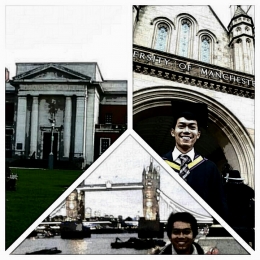From a muddy riverbank in the outskirt Jakarta to have visited the glamorous New York. From a shanty town in Tangerang to have studied and lived in the vigorous Manchester. And to name a few: to have joined the Indonesian Faculty at University of Wisconsin, to have seen the Charles Bridge in Prague and Eiffel Tower in Paris, I considered myself a lucky one. Financially I cannot afford all those experiences. As a son of a warteg (a small food stall aiming for working class customers) owner, I never thought I could have achieved this far. My parents found it very challenging to send me to school – as education is not their main concern, and they dropped out from middle school to start working at early age.
I then started to think very hard. The only way for me to pursue higher education was to get a scholarship. I asked a number of people, browsed the internet and found some opportunities. And the result: a short scholarship programme to University of South Carolina, USA (2008), a Fulbright Foreign Language Teaching Assistant (FLTA) to University of Wisconsin, Madison, USA (2012 – 2013) and a Master scholarship from Lembaga Pengelola Dana Pendidikan (Indonesia Endowment Fund for Education, LPDP) Indonesia to study at The University of Manchester, UK (2014 – 2015).
Am I that genius? The answer is no. I always believe that one does not have to be super genius to get accepted for a scholarship programme or at a university. To know the trick; that’s the key. Almost all scholarship programmes and university enrollment require the same application procedure: application form, score of English proficiency test (for non-native English speakers) and personal statement.
In 2014 I got accepted to three universities (MA Intercultural Communication, The University of Manchester, UK; MA Applied Linguistics, University of Melbourne, Australia; and MA Sociocultural Linguistics, Goldsmiths College, University of London – I’m afraid I sound bragging so much now). Although they are not in top 10 world university ranking, at least they are some of the prestigious universities in the world. Thanks to LPDP Indonesia for giving me the full scholarship.
I went through the same process: completing the application form, writing some essays and facing the interview. Here I would like to share some tips on writing successful application. I know I may not be the expert to talk about it, but I hope you find it useful somehow.
- Who am I? – Knowing yourself
That is the first, basic question one should be able to answer before starting to apply for a scholarship programme or a university. Knowing yourself will allow you to describe yourself, your strengths and your passion clearly. It will then enable you to stand out among other applicants. To answer this question, I usually divide it into three parts: my past, my present and my future plans.
One’s family background, childhood experience or passion that she/he has long kept could be a strong point. I remember I found my passion for education when I was in primary school. During the end of school year or Christmas holiday, I usually summoned the kids in my neighbourhood and taught them how to read, to write and to solve simple Maths problems. On the riverbank (that was our backyard) I and some of my cousins did that as a regular hobby to spend our holiday. From that point I knew that I had a strong passion in education. Whenever people asked what my dream job was, I always told them that I wanted to be a teacher. A childhood dream that has led me to who I am now (present). And my past that has inspired my future goals.
I noticed that such story may have strengthened my application. You might not have the same story, but I am sure there is a particular experience or memory that inspires you and is related to the field of study you have chosen. Explore it and that could be the attention grabber of your application.
- Choosing the right one
Knowing yourself will also help you complete the application requirement smoothly. The next challenge is to search for the right programme and university. You know your passion, where you are now and what your future goals are, so now this is the time to select the programme and the university. I would suggest you not to focus on big names. I know everyone would love to get admitted to Harvard or Oxford, but your programme could be best conducted in some other universities.
Internet could be best tool to help you. You may want to type “top 5 linguistics (or your field of study) schools” in your search engine. After you have found some, I would advise you to spend hours on the university website to get to know the programme better.







